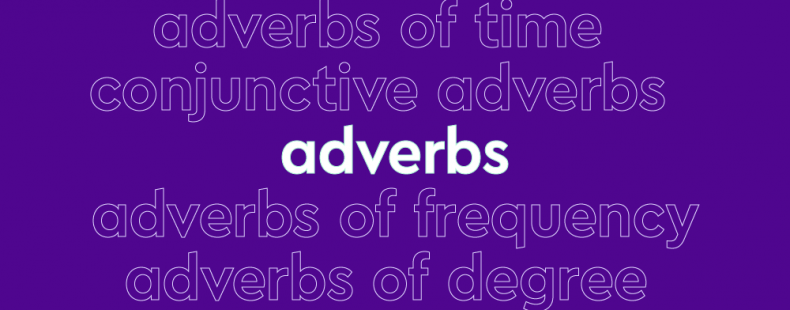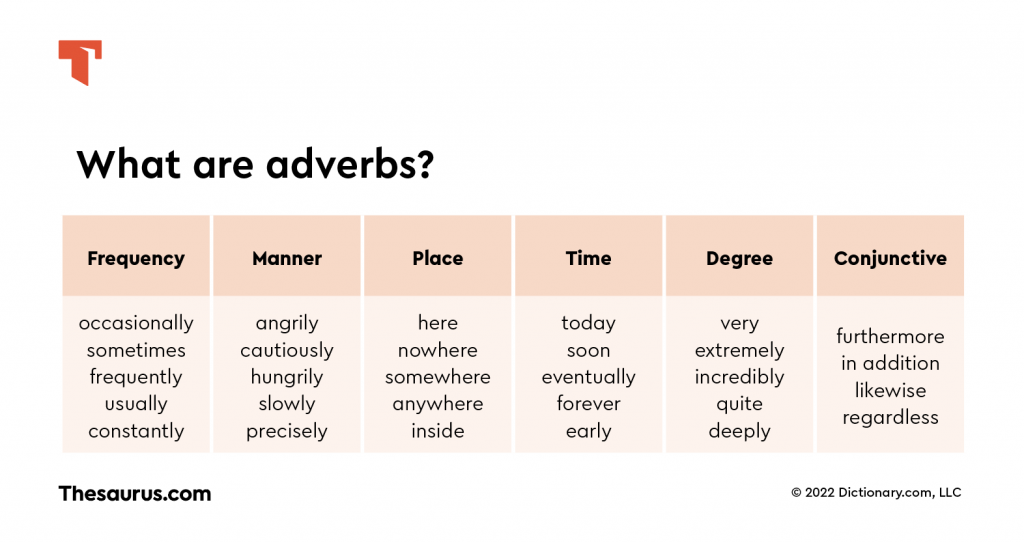Adverbs are a major part of speech that we use to modify verbs, adjectives, clauses, and even other adverbs. If you’ve studied grammar, you probably know that words like calmly, everywhere, and soon are examples of adverbs. But did you know that there are different types of adverbs? It’s true, and we are going to learn how versatile adverbs can be by learning more about six common types of adverbs that we use all of the time.
What is an adverb?
An adverb is a word that modifies a verb, an adjective, a clause, or another adverb. Adverbs provide more information in a sentence by modifying another word. For example, the adverb quickly in the sentence Jeremiah ran quickly tells us that Jeremiah ran with high speed. As another example, the adverb really in the sentence The movie was really boring tells us that the movie wasn’t just boring but that it was a colossal snooze-fest.
Different types of adverbs
Like other parts of speech such as nouns and verbs, there are several different types of adverbs. For the most part, adverbs are usually separated by what kind of questions they answer or what kind of information they provide to us. Right now, we are going to look at six common types of adverbs:
- Conjunctive adverbs
- Adverbs of frequency
- Adverbs of time
- Adverbs of manner
- Adverbs of degree
- Adverbs of place
1. Conjunctive adverbs
Unlike the other types of adverbs we will look at, conjunctive adverbs play an important grammatical role in sentences. Basically, a conjunctive adverb is an adverb that acts like a conjunction; a conjunctive adverb is used to connect two clauses or two sentences together. For example:
- I went to the store to buy new shoes. However, the store was already closed when I got there.
In the second sentence, the conjunctive adverb however tells us that this sentence is related to the one immediately before it. The adverb however acts like a conjunction by linking these two sentences together.
We can also use conjunctive adverbs with a semicolon rather than a period:
- Tina wasn’t too confident about her answers; nevertheless, she passed the exam easily.
Examples of conjunctive adverbs used in sentences
- Joey was playing in the sandbox. Meanwhile, his brother Noah was sleeping in a hammock.
- Candy isn’t a healthy breakfast. Instead, you could eat fruit.
- Delilah is the most popular member of the band; therefore, her name is always first on the posters.
Don’t fall behind on this topic. Instead, learn more about conjunctive adverbs.
2. Adverbs of frequency
A number of adverbs are used to describe the frequency of an event. By doing so, these adverbs describe how often something happens.
Examples
- constantly, frequently, occasionally, sometimes, usually, never, always, rarely, daily, weekly, monthly, yearly
Examples of adverbs of frequency used in sentences
- I usually put butter and syrup on my pancakes.
- She never drives on icy roads.
- Sometimes, Mark gets coffee for his coworkers.
3. Adverbs of time
Some adverbs tell us when something happens. Adverbs of time include words that refer to specific times and more general time periods.
Examples
- today, yesterday, tomorrow, tonight, soon, later, now, eventually, forever, still, yet, early, late, recently, since
Examples of adverbs of time used in sentences
- We are going to see a movie tomorrow.
- My daughter hasn’t learned how to tie her shoes yet.
- Recently, Trevor got a job as a construction worker.
4. Adverbs of manner
Adverbs of manner tell us how something happens. A huge number of adverbs fall under this type and many of the -ly adverbs formed from adjectives fit into this group.
Examples
- angrily, cautiously, hungrily, nicely, slowly, deftly, precisely, unknowingly, loudly
Examples of adverbs of manner used in sentences
- The clown skillfully made animals out of balloons.
- She bravely rescued a kitten from a tree.
- Natalie wisely took an extra umbrella with her.
5. Adverbs of degree
Generally, adverbs of degree describe the intensity of an action or quality. These adverbs are often used as intensifiers to describe adjectives and other adverbs.
Examples
- very, really, extremely, incredibly, too, quite, barely, deeply, fairly, greatly, hardly, highly, intensely, somewhat, totally, little, less, least, much, more, most
Examples of adverbs of degree used in sentences
- It is really hot in the basement.
- That book is much too expensive.
- He barely knew how to cook at all.
6. Adverbs of place
Adverbs of place tell us where something happens.
Examples
- here, there, everywhere, nowhere, somewhere, anywhere, in, out, inside, outside, wherever, on, off, over, under, away, left, right, north, south, east, west
Examples of adverbs of place used in sentences
- I can’t find my keys anywhere.
- She loves to spend sunny afternoons outside by the pool.
- The lost travelers went north until they found a small town.
You might discuss place with a prepositional phrase as well. Learn more about them here.
Write smarter with Grammar Coach™
We’ve got an adverb for you: quickly! That is, you should quickly check out Thesaurus.com’s Grammar Coach™ and find out what it can do for you. This writing tool examines your writing using machine learning technology uniquely designed to catch grammar and spelling errors. Its Synonym Swap will find the best nouns, adjectives, and more to help say what you really mean, guiding you toward clearer, stronger, writing.
Demonstrate your understanding of the types of adverbs by taking this quiz.
















